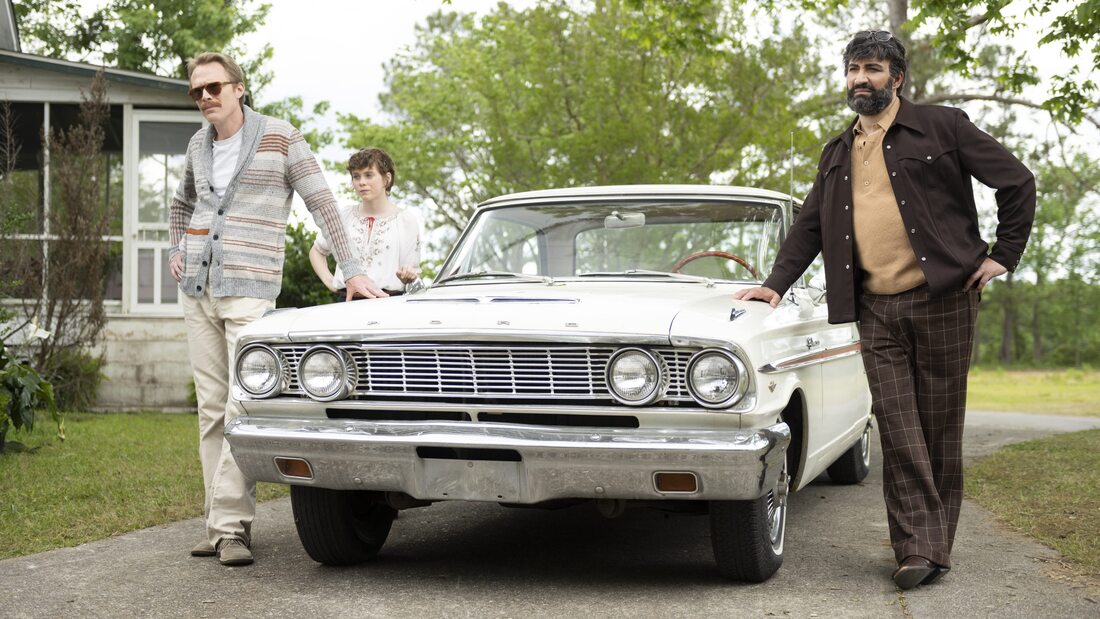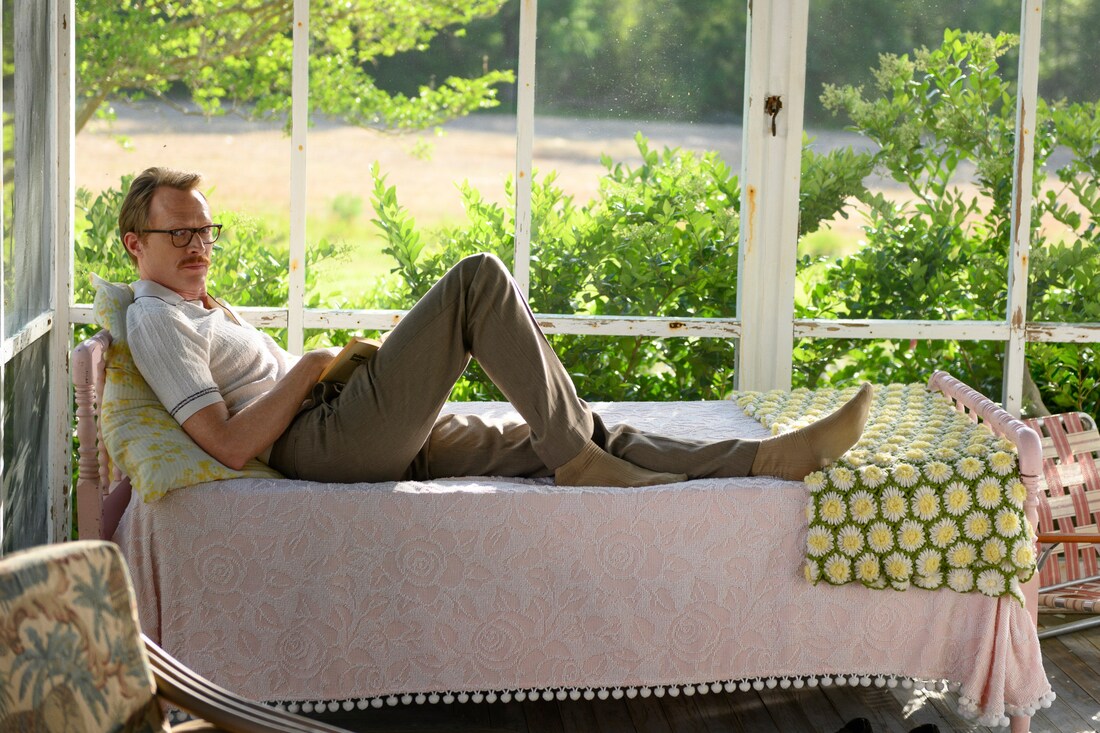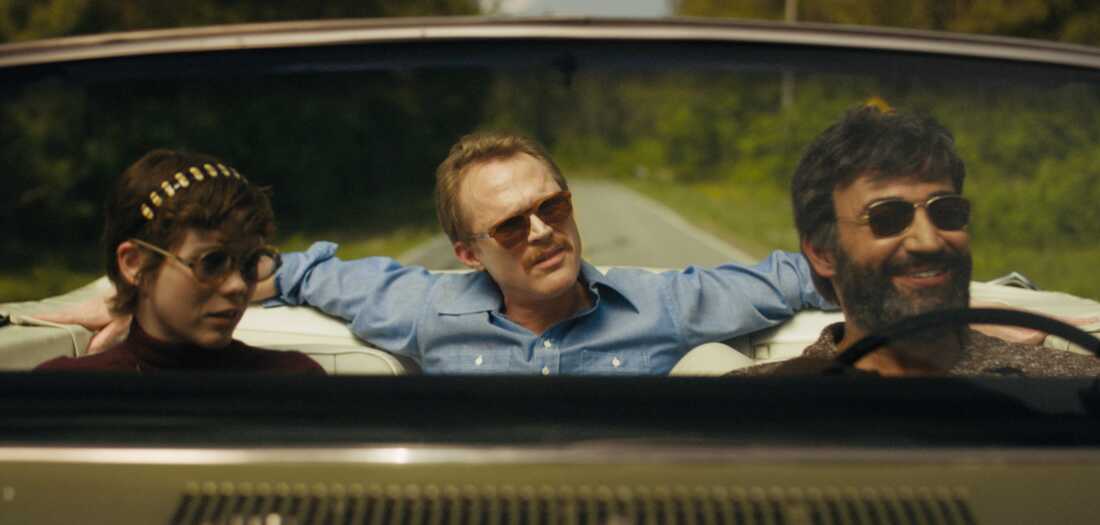by Emilie Rush
In a world of Lady Bird and Call Me By Your Name, at first glance Uncle Frank (Alan Ball, 2020) doesn’t seem like the revolutionary coming of age story we needed at the end of 2020. But it’s the unexpectedly powerful performance of Paul Bettany that makes this film one to watch. The movie follows a simple country girl named Beth (Sophie Lillis) travels to the big city, and is introduced to the world through the lens of the relationship of her cool Uncle Frank (Paul Bettany) and his partner (Wally). Their family back home in the south reacts to this new revelation about his lifestyle! Luckily, all is revealed after the death of the beloved family patriarch softens the blow of all the devastations, and in fact brings them all closer together in a true nostalgic American family tale. This is not a traditional story, where Beth would be the one navigating her coming of age journey. No, it’s Frank who comes of age, giving this emotionally heavy film the unique deposition of flipping conventionally on it’s head.
Recently, the world of acting has been plagued by an ongoing conversation surrounding what exactly an actor's job is. Is an actor person who steps into the shoes created for him by a writer, and sculpted by the director, leaving him to be only the clay in the performance? Is an actor himself the scribe, bequeathed with inspiration from a script, and illuminated by lights and a camera, writing and establishing a character like pulling a rabbit out of a hat? How much agency does an actor have? Does he possess permission to stand on stage or on set, and transform himself into someone else, perhaps a different race, sexuality, or creed. And if he does not, who does? And why not?
In the conversation of authenticity in the world of acting, director Russell T Davies, creator of Queer as Folk, remarked “I feel strongly that if I cast someone in a story, I am casting them to act as a love, or an enemy, or someone on drugs, or a criminal or a saint...they are not there to “act gay” because “acting gay” is a bunch of codes for a performance.” Queer as Folk was one of the first shows to showcase and talk about the LGBTQ+ experience on television, and it featured straight actors in playing gay roles.
Like many other LGBTQ+ actors, making the decision not to take straight roles would be especially damming. Although the tide is changing for marginalized communities onscreen, the amount of these characters available is still small. Although Davies and Harris have differing opinions, the conversation about performance authenticity has the potential to spur big change in Hollywood.
Enter Paul Bettany. He is an icon in the making, especially in 2021, and it’s so interesting to see this performance right off the heels of the newest episode of Wandavision, which most people may recognize him from. The MCU has been criticized for its lack of acting, pacing, depth, but here Disney proves that they have a good eye for talent. Some people spend years waiting for the spotlight, for their big breaks, but Bettany has had multiple. Reinventing himself before the camera time and time again, he’s an actor with as much chameleon-esque bravado as Johnny Depp. In 2001 he was in A Knight’s Tale and A Beautiful Mind. In 2006 he was in The Da Vinci Code. For the past twelve years he’s been routinely in conversation as Jarvis/Vision, and he even hopped franchises and did a stint with Solo: A Star Wars Story.
But how does Bettany and Uncle Frank fit into this the conversation of performance authenticity? Bettany is straight, but Frank Bledsoe, the title character of the film, is gay, and it’s the developing characteristic of the main plot line in the movie. Bettany’s performance justifies Harris’ argument that it’s not about the actor really identifying as gay or straight at all, rather it’s about the passion, humility, and cadence brought to the craft that matters.
When Frank holds back Beth’s hair at the apartment party scene, as she vomits, I believe his performance, which is always easier said than done. One of the hardest relationships to act, to fake, is the relationship between family members. The more intimate the script forces them to be, the harder the job it becomes. But looking into Bettany’s eyes it looks natural, as if he himself is Frank Bledsoe and Paul Bettany is just an illusion, not the other way around. Bettany himself has a young daughter (and son), which probably helped him build the foundation arguably the central, and the most changing, element of the film. It's hard to act out something that is completely unfamiliar to you, and a lot of times when an actor has nothing to pull from, weakens their performance and severs the link between the character and an audience, which is why performance authenticity matters.
Russell T Davies worried about the invisible codes used to portray a gay character, and how they might pull the audience out of suspended disbelief if done in correctly, if done by someone who had to fake it. The difference between Davies’ fear and Bettany’s performance is that this transcendent possibly futuristic view of sexuality and love that allows a person to be a human first, and who they love isn’t inherently a personality trait. The audience gets confirmation that Frank is gay within the first thirty minutes of the film, but considering how his family acts towards him at the film’s opening, it’s no surprise. Still after the big reveal, Bettany does not revert to the old-fashioned coding and performance stereotypes of portraying a gay man. Bettany pulls on love, unacceptance, and fear to create his performance, he loves Wally, and he loves him the same way, and with the same capacity that any human loves another. This is authenticity.
Paul Bettany as Frank Bledsoe is the best performance that Uncle Frank has to offer. Bettany spirals from a man living divorced and in contempt of his family, to one that is tortured by his past and present. The art of being Frank Bledsoe is so well crafted that it seems like it would fit better on stage, rather than the small screen of an indie movie.




 RSS Feed
RSS Feed
